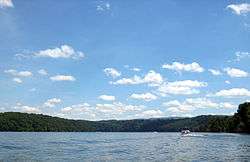Claytor Lake
Claytor Lake in Pulaski County, Virginia, is a 4,472-acre (1,810 ha), 21-mile-long (34 km) reservoir on the New River, created for an Appalachian Power Company hydroelectric project. It is named for W. Graham Claytor, Sr. (1886–1971) of Roanoke, Virginia, a vice president of Appalachian Power who had supervised the construction of the Claytor Dam, which created the lake.
| Claytor Lake | |
|---|---|
 | |
| Location | Pulaski County, Virginia, United States |
| Coordinates | 37°04′30″N 80°35′05″W |
| Lake type | reservoir |
| Primary inflows | New River |
| Primary outflows | New River |
| Basin countries | United States |
| Max. length | 21.67 mi (34.87 km) |
| Surface area | 4,472 acres (1,810 ha) |
| Surface elevation | 1,846 ft (563 m) (normal full pool) |
Three miles of Claytor Lake's shoreline is bordered by Virginia's Claytor Lake State Park.[1]
History
In 1910, the New River Power Company began acquiring land on the New River south of Radford, Virginia for the impoundment for several hydroelectric dam projects.[2] By 1925, these projects had been combined, and control of the project passed to Appalachian Power Company.[3] The construction of Development No. 6, later called the Claytor Dam, began in 1937 and was completed in 1939.[4] By the Spring of 1940, the New River was fully impounded, and Claytor Lake was formed.
Claytor Dam is a concrete gravity dam, impounding an estimated storage capacity of 225,000 acre-feet. The plant is the largest of the power company's 12 hydroelectric plants, with a total generating capacity of 75 megawatts.[5]
In early 1944, the people of the surrounding area expressed an interest in the establishment of a state park on the new lake. The idea continued to grow, and in 1946 private citizens and businesses from Pulaski, Radford and Blacksburg raised the money needed to purchase 437 acres (1.77 km2) from Appalachian Power. This land was given to the state to be developed as Claytor Lake State Park.
Friends of Claytor Lake
Friends of Claytor Lake is a non-profit organization that is dedicated to the environmental conservation of Claytor Lake. They operate a clean-up crew to remove debris from Claytor Lake, averaging 6,000 tons of debris and trash each year. They also support programs in boater safety, water quality, hydrilla control, and other areas related to recreation and the environment.[6]
New River Trail

The New River Trail State Park, a rail trail that was built on top of an abandoned Norfolk Southern Railway right-of-way, follows part of the shoreline of Claytor Lake and crosses it on the Hiwassee Bridge. The 951-foot-long (290 m) bridge was built in 1931 by the Virginia Bridge and Iron Co. of Roanoke, a subsidiary of the Norfolk and Western Railway.
Recreational activities
Popular activities at Claytor Lake include powerboating, sailing and various watersports.
Fishing has also become a major attraction at Claytor Lake. The most plentiful fish in the lake are bluegill, a form of sunfish. Most commonly they are in the 6" to 8" (15–20 cm) range and weigh less than a pound. Catfish are also popular in Claytor Lake, some of them getting quite large (well over 50 lb (22 kg)). The main sporting varieties are largemouth bass, smallmouth bass and striped bass. Large and small mouth bass fishing tournaments are a regular seasonal event at Claytor Lake with weights of 15 to 20 lb (7 to 9 kg) per fisherman being an average winning catch. All tournament fishing is catch and release and most is done by local clubs. Striped bass fishing occurs year-round with various techniques. The average "striper" (as they are commonly known) is about 8 lb (4 kg) but catches close to 30 lb (14 kg) have been reported.
Several high cliffs of shale rock ring the lake shoreline. This material is generally loose and unstable, and therefore climbing is not permitted.
The Blue Ridge Mountains Council of the Boy Scouts of America operates the Claytor Lake Aquatics Base on the shore of the lake. It offers sailing, rowing, and other watersports such as wakeboarding to the Boy Scouts who spend a week there during the summer. It also offers a program to earn a PADI scuba diving certification over the course of the week.[7]
References
- "Claytor Lake". Virginia State Parks. Retrieved 2011-05-26.
- Jones, Heather C.; Harvey, Bruce (2012). "Dunkard's Bottom: Memories on the Virginia Landscape, 1745 to 1940: Historical Investigations for Site 44PU164 at the Claytor Hydroelectric Project, Pulaski County, Virginia, FERC Project No. 739" (PDF). claytorhydro.com. Retrieved May 30, 2015.
- "Power Company Closes Deal for Poor House Farm Land". Southwest Times. June 23, 1925. Retrieved May 31, 2015.
- http://www.frenchriverland.com/claytor_dam.htm, accessed May 30, 2015.
- http://www.claytorhydro.com/about/
- "About Us". The Friends of Claytor Lake. Archived from the original on 10 November 2016. Retrieved 5 November 2017.
- "Claytor Lake Aquatics Base". Blue Ridge Mountains Council, Boy Scouts of America. Archived from the original on 2017-02-17. Retrieved 2017-02-17.CS1 maint: BOT: original-url status unknown (link)
External links
| Wikimedia Commons has media related to Claytor Lake State Park. |
- ClaytorLakeOnline.com
- Claytor Lake State Park
- Claytor Lake, Virginia Department of Game and Inland Fisheries
- Friends of Claytor Lake
- Claytor Lake Sailing Association
- Claytor-Lake.net web portal